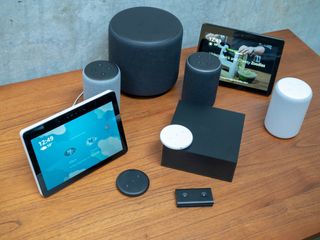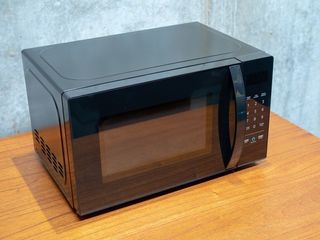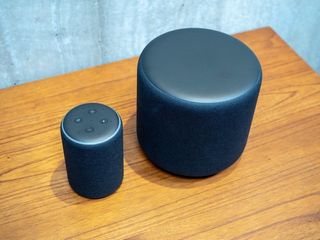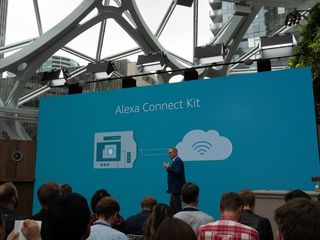Amazon just asked Alexa to declare war on every smart home company

The AmazonBasics Microwave stole many of the headlines as a wacky device that there was no way Amazon was going to actually announce. But today, it did. The microwave itself isn't interesting in the least — it's the most generic, cheap-looking microwave this side of a college dorm room. But it, along with the dozen other Echo-related hardware announcements Amazon just made, marks the point at which Amazon declared war on every other smart home device company.
Because anything you can do, Amazon can do cheaper. And in the current world of smart home devices, that's incredibly important. We've mostly left the world of unnecessarily expensive smart home gadgets like $50 connected lightbulbs and such, but this smart home gear is still very spendy compared to the "dumb" versions of these things we already have in our homes.
Everything Amazon announced at its hardware event

Amazon's economies of scale are going to plow it into the top sales charts of every smart home segment it enters, just as it's done in so many other industries. There are few companies that can make these smart home products as cheaply as Amazon. The new Amazon Smart Plug is $25. The Echo Input is $35. The Echo Wall Clock is $30. Amazon is selling the new-and-improved Echo Dot and Echo Plus for the same price you'd pay for plain old Bluetooth speakers that have no smart capabilities and probably worse audio quality. And by the way the new Echo Plus has a temperature sensor built in. You won't be buying one of those separately anymore.
Amazon is amazingly good at making good products for less — now, it can make smart products for less too.
The products that are most interesting in this context are the ones that are actually the least-interesting products (stay with me here). The microwave and clock, for example, are super-basic products that you normally wouldn't think about or research for more than 10 minutes before buying. They're impulse-purchase items where you so often make a decision based on price — and Amazon is able to offer these items at competitive prices, delivered tomorrow ... but they're "smart" versions of the products. The use of the AmazonBasics brand is particularly intriguing, because that's the brand it applies to value-focused products across so many market segments already — and in most cases, they are so good yet so cheap that they kill the competition.
It's a strategy that's now going to kill businesses in the smart home segment. Not only can Amazon make and sell solid hardware for the same or less than the competition, it undoubtedly has better name recognition at the same time. And in areas where it doesn't, it simply buys it — look at the acquisition of Ring as a perfect example. It takes the brand and the product line, and immediately starts iterating on it with those same great economies of scale — and broad Amazon ecosystem synergies — to take on the competition in the home security segment practically overnight.

Once the functionality gets near parity, people start caring about brand name and price — Amazon can win in both.
Amazon's gunning hard for Sonos, too. The Echo Plus (and even Echo Dot) keeps getting audio improvements, and now the speakers can be paired together, tied to a new Echo Sub, and synced across your home with multi-room audio. Oh and naturally the Echo Plus is cheaper than a Play One, and the Echo Sub is one-fifth the price of the Sonos Sub. A bundle of two Echo Plus speakers and an Echo Sub is less than a Sonos Play:5. Want to link up other speakers instead? You have the Echo Input and Echo Link Amp.
Be an expert in 5 minutes
Get the latest news from Android Central, your trusted companion in the world of Android
An overwhelming majority of people don't care that the Sonos has better in audio quality across the board — and when the functionality is effectively the same as the competition, the price is then the killer feature. Amazon always wins in the price category. Sonos will still own the very high-end tier of people who are not price-sensitive and are willing to pay for the brand and the better audio quality, but Amazon's latest home audio efforts are going to sweep up the (larger) lower end of the market that would normally stretch to buy a few Sonos speakers.

Amazon plays nice with partners — until it wants to enter the same segment itself.
Of course Amazon is playing nice in its forward-facing announcements. It has a new Alexa Connect Kit that's a plug-and-play all-in-one board for turning companies' dumb appliances into smart ones with little development work. It's offering open and free APIs for companies to make their devices work with the larger Alexa ecosystem. But there's one thread that runs through all of this: these are ways for your products to integrate with Amazon's platform. It's a stopgap to get appliances and other smart home tech on board from other companies in segments where Amazon doesn't (yet) operate. But when you look at the types of products it rolled out today, no product segment can be considered safe.
Other companies will keep making smart home gadgets, and many will even be happy to play in the Alexa ecosystem. But not a single company should laugh off Amazon's presence in the space. Whether you look at the last two years of Echo sales or the near-dozen new products announced today, it's clear Amazon has little restraint when it comes to entering new segments. Get ready for a fight.
Andrew was an Executive Editor, U.S. at Android Central between 2012 and 2020.

